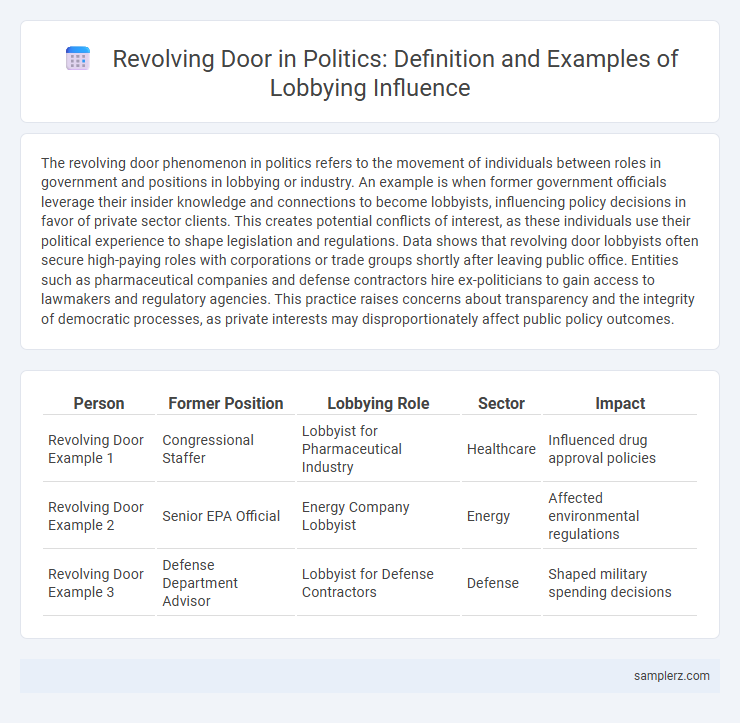The revolving door phenomenon in politics refers to the movement of individuals between roles in government and positions in lobbying or industry. An example is when former government officials leverage their insider knowledge and connections to become lobbyists, influencing policy decisions in favor of private sector clients. This creates potential conflicts of interest, as these individuals use their political experience to shape legislation and regulations. Data shows that revolving door lobbyists often secure high-paying roles with corporations or trade groups shortly after leaving public office. Entities such as pharmaceutical companies and defense contractors hire ex-politicians to gain access to lawmakers and regulatory agencies. This practice raises concerns about transparency and the integrity of democratic processes, as private interests may disproportionately affect public policy outcomes.
Table of Comparison
| Person | Former Position | Lobbying Role | Sector | Impact |
|---|---|---|---|---|
| Revolving Door Example 1 | Congressional Staffer | Lobbyist for Pharmaceutical Industry | Healthcare | Influenced drug approval policies |
| Revolving Door Example 2 | Senior EPA Official | Energy Company Lobbyist | Energy | Affected environmental regulations |
| Revolving Door Example 3 | Defense Department Advisor | Lobbyist for Defense Contractors | Defense | Shaped military spending decisions |
High-Profile Politicians Turned Corporate Lobbyists
High-profile politicians such as former U.S. Speaker of the House John Boehner and ex-Senator Jon Kyl exemplify the revolving door phenomenon by transitioning into lucrative corporate lobbying roles shortly after leaving office. These figures leverage their deep government connections and policy expertise to influence legislative outcomes on behalf of major industries like pharmaceuticals, energy, and finance. This revolving door dynamic raises concerns about regulatory capture and the erosion of democratic transparency in policymaking.
Major Cases of Lawmakers Joining Lobby Firms
High-profile revolving door cases in politics include former lawmakers like Senator Jon Kyl, who transitioned to lobbying roles at influential firms such as Covington & Burling, leveraging their legislative expertise to influence policy on behalf of corporate clients. Another notable example is former Representative Billy Tauzin, who became president of PhRMA, using his congressional insight to advocate for pharmaceutical interests. These transitions highlight the challenges in regulating the revolving door between Capitol Hill and powerful lobby groups shaping U.S. legislation.
Government Officials Taking Roles in Industry Groups
Government officials frequently transition to influential positions within industry groups, leveraging insider knowledge and networks to advance sector-specific agendas. This revolving door phenomenon is evident in cases such as former regulators joining major pharmaceutical or energy lobby organizations. Such moves raise concerns about conflicts of interest and regulatory capture, as these individuals may prioritize industry profits over public policy integrity.
Former Regulators Influencing Policy Through Lobbying
Former regulators frequently leverage their insider knowledge and connections by transitioning into lobbying roles, shaping policy to benefit specific industries. This revolving door phenomenon undermines regulatory integrity as ex-officials use their expertise to influence legislation in favor of private sector interests. Studies reveal significant increases in lobbying success rates when former government officials advocate for corporate clients.
Examples of Congressional Staff Shifting to Private Sector Advocacy
Several former congressional staffers transition to private sector lobbying firms, leveraging insider knowledge to influence legislation effectively. Notable examples include Amy Rosenberg, who left her Senate Appropriations Committee role to join a major defense contractor's lobbying team. This revolving door phenomenon raises concerns about conflicts of interest and policy capture in Washington, D.C.
Ex-White House Advisors Navigating the Lobbying World
Ex-White House advisors often transition into lucrative roles as lobbyists, leveraging their insider knowledge and government connections to influence legislation and policy decisions. This revolving door phenomenon raises ethical concerns as it blurs the line between public service and private gain, enabling former officials to advocate for special interests with privileged access. Notable cases include advisors from the Obama and Trump administrations who have secured positions in major lobbying firms or corporate PACs to shape regulatory agendas.
Cabinet Members Leveraging Government Experience for Industry Interests
Former Cabinet members often join influential lobbying firms, capitalizing on their deep understanding of regulatory processes and established political networks to advance industry agendas. This revolving door phenomenon enables companies to gain strategic insights and preferential access to lawmakers, effectively shaping legislation in their favor. Such transitions highlight concerns about conflicts of interest and the potential erosion of public trust in governmental impartiality.
Defense Department Leaders Entering Arms Lobby Roles
Defense Department leaders frequently transition into high-profile roles within arms lobbying firms, leveraging their insider knowledge of military procurement and defense policies. This revolving door phenomenon raises concerns about conflicts of interest, as former officials influence government contracts and regulations favoring their new employers. Recent cases include senior Pentagon officials securing lucrative positions with major defense contractors such as Lockheed Martin and Raytheon.
Healthcare Policy Makers Transitioning into Pharmaceutical Lobbying
Healthcare policy makers frequently transition into pharmaceutical lobbying roles, leveraging insider knowledge to influence drug approval processes and pricing regulations. This revolving door phenomenon raises ethical concerns as former regulators advocate for industry interests, potentially compromising public health priorities. Studies indicate that such transitions can result in regulatory capture, undermining the integrity of healthcare policy decisions.
Public Interest Concerns Over Revolving Door Practices in Politics
Revolving door practices raise significant public interest concerns by enabling former politicians and government officials to leverage insider knowledge and connections for private lobbyist gains. This dynamic undermines policy integrity and fuels perceptions of corruption as private interests gain disproportionate influence over public decision-making. Transparency measures and stricter regulations are essential to mitigate conflicts of interest and restore public trust in democratic institutions.

example of revolvingdoor in lobby Infographic
 samplerz.com
samplerz.com